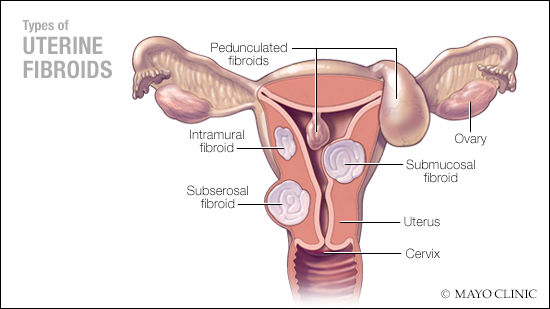-
Mayo Clinic Minute: Treatment for uterine fibroids without surgery
A newer, more effective treatment for uterine fibroids is available that doesn't require surgery.
That's good news for the estimated 26 million women in the U.S. who have fibroids — including the millions of Black women who are disproportionately affected by these benign tumors. Black women in the U.S. are up to three times more likely to develop fibroids than white women.
Dr. Elizabeth Stewart, a Mayo Clinic gynecologist and researcher, recently published a review on these approved fibroid medications. They are called oral gonadotropin-releasing hormone (GnRH) antagonist combinations.
Journalists: Broadcast-quality video (TRT 1:00) is in the downloads at the end of this post. Please courtesy: "Mayo Clinic News Network." Read the script.
"There are two new FDA-approved drugs for the medical treatment of uterine fibroids," says Dr. Stewart.
Dr. Stewart says the drugs are effective in treating heavy menstrual bleeding, relieving pain and reducing the need for a hysterectomy.
"Because many women are pushed in the direction of surgical therapy, and we know there are big limitations to surgical therapies, this is a great treatment option for many women," Dr. Stewart says.

Fibroids are benign growths in the uterus. While common, they can be disruptive.
And disproportionally affect women of color.
"There's evidence that Black women are more likely to have fibroids and more likely to have severe fibroids and severe fibroid symptoms," says Dr. Stewart.
She is encouraged.
"To be able to take a medication and get terrific relief of their symptoms, I think will be a game-changer for many women."
Gonadotropin-releasing hormone agonists (GnRHa)
These medicines block the body from making the hormones that cause women to ovulate and have their periods. The medicines don't eliminate your fibroids but they do reduce their size. The FDA has approved the use of these oral therapies for up to two years.
Uterine fibroid symptoms
Not everyone who has fibroids will experience symptoms. Fibroids are most common in women in their 40s and early 50s. And having a family member with fibroids increases your risk.
Common symptoms include:
- Heavy menstrual bleeding.
- Menstrual periods lasting more than a week.
- Pelvic pressure or pain.
- Pain during sex.
- Frequent urination.
Along with these medications, there are other options for treating fibroids. It's important to talk with your health care professional to discuss the best treatment for you.
Related posts:
- Mayo Clinic Minute: Fighting fibroids
- Mayo Clinic Minute: 4 myths about fibroids
- Women’s Wellness: Uterine fibroids are common noncancerous growths
About Dr. Stewart's work:
Dr. Stewart was recently announced a winner of a 2022 Pitkin Award and 2022 Kaminetzky Prize Paper, for Relugolix Combination Therapy for Uterine Leiomyoma–Associated Pain in the LIBERTY Randomized Trials, of which she was lead author.







